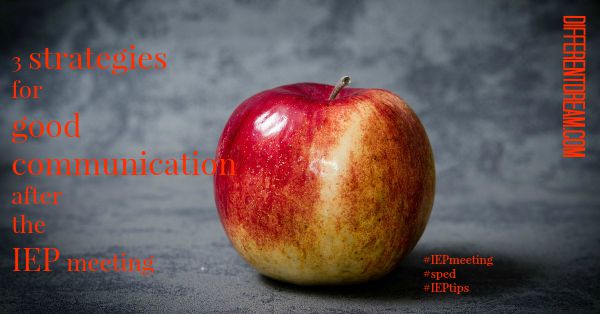3 Strategies for Good Communication After an IEP Meeting

Welcome to DifferentDream.com, a website for parents of kids with special needs. Today’s post is the fourth and last in a series based on wisdom shared at last spring’s Accessibility Summit. One of the workshops at the Summit, Advocacy: Critical Conversations with Collaborative Outcomes, featured a blue ribbon panel of educators and parents: Ann Hines, principal at Rosa Lee Carter Elementary School; Barbara Tresness from the CHAT Collective; Linda Starnes, Parent Advocate; and Brendon Wolfe, principal of the S. John Davis Career Center. The educators ended their round table discussion with these three tips for fostering good communication after an IEP meeting is over.
- Talk about what communication looks like. Administrators should talk to parents about what communication looks like to parents and what it looks like to the administrators. That way both parties know what the other party expects.
- Parents should ask teachers how to contact them. Do they prefer email, phone, text, or paper and pencil notes? Use that means to make sure the teacher has been educated about specific medical, feeding, and toileting conditions. And remember, teachers love to get happy notes from parents now and then.
- When communication breaks down, go through the proper channels. If communication breaks down with the teacher, talk to the teacher first to try to resolve the issue. If that doesn’t work, contact the special education contact person. If the outcome of that meeting is unsatisfactory, talk to the administrator in your child’s building. Continue going up the ladder until communication issues have been resolved. And remember to be as respectful as possible at every meeting.
How Do You Foster Good Communication after an IEP Meeting?
How do you maintain good communication after an IEP meeting is over? What works and what doesn’t work? Leave your ideas in the comment box if you like.
Part One: 7 Ways to Advocate Before an IEP Meeting
Part Two: 4 Special Needs Obstacles to Avoid at School
Part Three: 10 Ways to Advocate at a Difficult IEP Meeting
Part Four: 3 Strategies for Good Communication after an IEP Meeting
Do you like what you see at DifferentDream.com? You can receive more great content by subscribing to the quarterly Different Dream newsletter and signing up for the daily RSS feed delivered to your email inbox. You can sign up for the first in the pop up box and the second at the bottom of this page.
By Jolene
Jolene Philo is the author of the Different Dream series for parents of kids with special needs. She speaks at parenting and special needs conferences around the country. She’s also the creator and host of the Different Dream website. Sharing Love Abundantly With Special Needs Families: The 5 Love Languages® for Parents Raising Children with Disabilities, which she co-authored with Dr. Gary Chapman, was released in August of 2019 and is available at local bookstores, their bookstore website, and at Amazon.
Subscribe for Updates from Jolene
Related Posts
My Favorite Vacation Planning Tips for Special Needs Families
Are you traveling this summer? Jolene provides her favorite vacation planning tips for special needs families.
The Weight of Silence as Parents of Kids with Invisible Disabilities
Guest blogger Lisa Pelissier explains the weight of silence as parents of kids with invisible disabilities.
How to Build a Thriving Marriage as You Care for Children with Special Needs
Todd and Kristin Evans explain how to build a thriving marriage as you care for children with special needs.






0 Comments